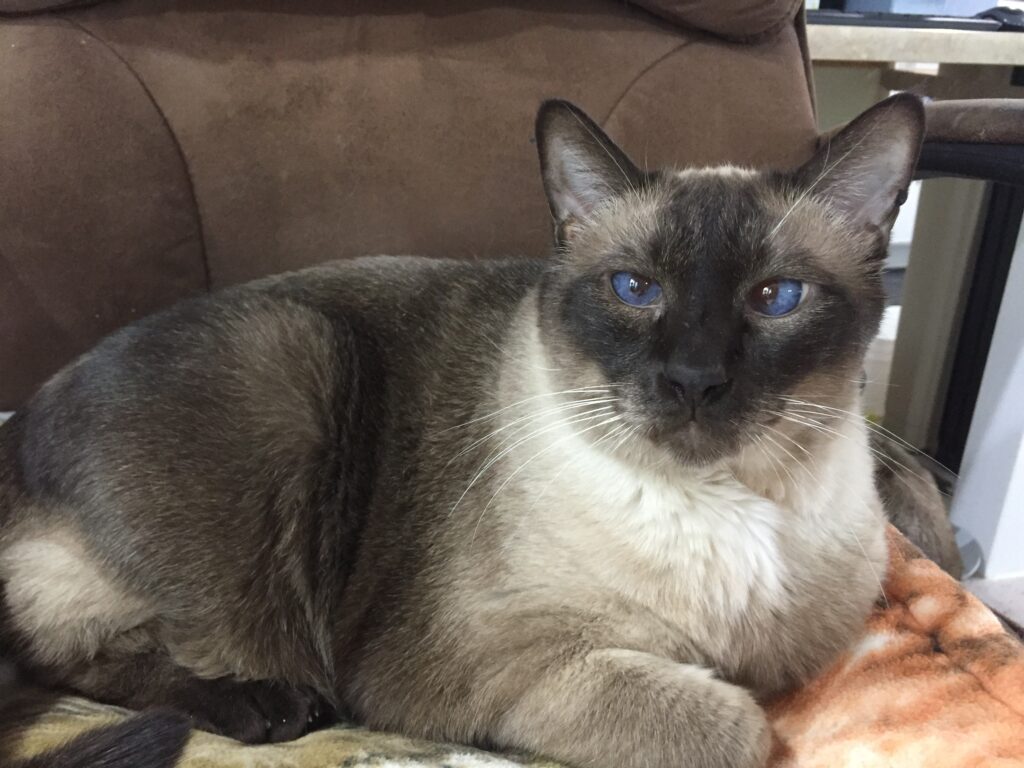When Siamese Rescue began (1998), there was so much I didn’t know – not only about the business of rescue itself, but also about cats and cat care in general. Sure, I had owned cats my entire life, and yes, many of them happened to be Siamese, but I was totally unprepared for the challenges that rescue would bring and the experiences it would provide. Every cat left us with something, and those lessons would serve us well, as the Rescue grew to help over 13,000 cats in 20+ years. Tiki, one of our earliest guests, showed us that rescuing cats went a lot further than managing their physical needs.
The call came on a Thursday evening; I had just collapsed at home after a full day in the special ed classroom. Having gotten my name from the local shelter, Mrs. B. had been watching a large male Siamese cat rambling around her back yard over the past few days. Assuming he belonged to a neighbor, she had watched his health slowly decline as she waited for his owner to take action. By Thursday morning, the cat was clearly struggling, his breathing labored. Realizing the neighbor was not going to take action, Mrs. B. insisted that I get there straight away.
When I arrived, I found all nine saggy pounds of “Tiki” hunched in a corner of a makeshift crate, looking very miserable. His lips hung in a rumpled fashion on his face; his eyes streamed water. Gathering him up, I called the vet, catching him just before closing and begging him to wait until I got there.
Ushering us in right away, the vet hummed and hawed, poked and prodded, examined and injected. Unable to either afford or get to the closest 24-hour emergency hospital, I headed home armed with a small pharmacy and with the understanding that there really was little hope for this lad unless I could convince him to eat. His fractured pelvis would heal itself, the extensive dental he desperately needed could be done at a later date. The immediate concern was getting him some nourishment. Without their sense of smell, many cats go into a slump and literally starve themselves to death, and Tiki was well on his way. A large-boned cat, his skin fell in folds and his expression held the look of a defeated soldier. A likely throw or fall from a moving car, said the vet; the human rejection and physical trauma painfully obvious.
Working out of my home and knowing he needed to be isolated from any other cats, Tiki got the upstairs bathroom. Covering the floor with soft towels, I was confident in my ability to provide an appetizing cuisine. Having done rescue now for a month or so, I had all the mainstays in the cupboard: various gourmet cat foods, both wet and dry, baby foods, tuna, canned shrimp, sardines, cottage cheese and so forth.
Over the next 24 hours I exhausted all these possibilities and then some. Tiki lay in a crumpled heap, showing not the slightest interest in anything put in front of him. His breathing was so loud and labored it could be heard through the door, putting my husband’s snoring to shame. Humidifiers, Eucalyptus oil, Vicks – nothing seemed to make the slightest bit of difference.
By Sunday, I realized I was very close to losing him and really needed to step up my game. But what to do? He was so depressed, completely closed to the world. Attempts to play had been futile, petting and brushing him evoked little response. A fishy calorie supplement on my finger inserted into his mouth dribbled out with no interest. (I was not yet versed in sub-q fluids). The situation was definitely a bleak one.
Figuring it was close to impossible to make things much worse, I decided to give up worrying about his physical ailments and instead concentrate on his psyche. Armed with towels, heaters, a blow dryer, shampoo, and nail clippers, I drew a long warm bath. Very slowly I lowered him in. Tiki lay like a rag doll, not having the strength to give even the slightest protest. I scrubbed and rinsed, soaped and soaked. The sweat trickled down my neck as the heater warmed the air to a steamy 95 degrees. Tiki molded to my hands in whatever form I needed, barely flicking a whisker as the bubbles enveloped his body. He was so relaxed, I wondered if I was going to lose him right then and there. And yet, as I continued to scrub, a light began to glow in Tiki’s eyes. Slowly stretching his neck, his tongue raked weakly across my hand. A muffled sound came from his throat, a very sorry attempt at a purr. With his eyes half closed, a look of sheer contentment crossed his face.
Fifteen minutes later, after soaping him ears to paws, I lifted him onto the softest towel I could find. Rubbing him briskly, I told him all about his future. Listening closely, he purred and stretched, arched and yawned, and when he couldn’t stand it any longer, took a paw in helping with the clean-up. Licking briskly himself, as well as me, he began to purr full throttle.
Next came the blow dryer. Tiki stood stock still with a very pleased look on his face while I blew and brushed and fluffed him clean. We finished with a nail trim and ear cleaning, and the once sad-looking Meezer was now a silky, handsome (saggy) bundle of contentness. I could almost see the positive energy flow through his limbs as to my delight, he lumbered over to the food bowl and began eating like there was no end in sight.
Six weeks later, I was packing Tiki’s belongings for his trip up north. He had made a remarkable recovery; sleeping in my daughter’s arms every night, crawling into our laps while we watched TV, smiling at us with that silly toothless grin he had. Still needing help up and down the stairs, Tiki had filled out most of his folds and blossomed into a handsome, distinguished gentleman. While a look of disapproval flickered across the vet’s face as I described the bath episode, he was astonished at the change and improvement he saw.
Tiki went on to live happily ever after in upstate New York, settling in with his new family and his best friend, Pippin. His teeth were fixed, his pelvis healed, and he got his second chance at life in a wonderful home. His personality was just like a marshmallow, said his owner, molding to whatever lap presented itself and taking whatever came his way in stride.
From that point forward, we spent an equal amount of time fixating on the cats’ mental baggage as we did addressing their physical issues. While we could fight for them, they had to fight for themselves as well, and they weren’t going to do that unless they felt safe and secure, loved and hopeful. If they didn’t feel loved, they didn’t want to live, and if they didn’t want to live, we were very likely to lose them, regardless of any physical interventions.


I was in tears reading this. So beautiful 🙏❤🐾
Thank you Erika! I have another one I hope to post later today I’m working on about a wonderful cat named Sebastian! Stay tuned!
Kim says: This is a beautiful story! Thank you for helping Tiki not only survive but thrive…and for all the kitties you have helped save.
Thank you Kim! Glad you enjoyed it! Trying to figure which kitty to write about next!
Tiki reminded me of our beloved Moon Pie…..what a sweetheart!
Nancy, he was just the best! One of the memorable ones (Moon Pie that is!!!)